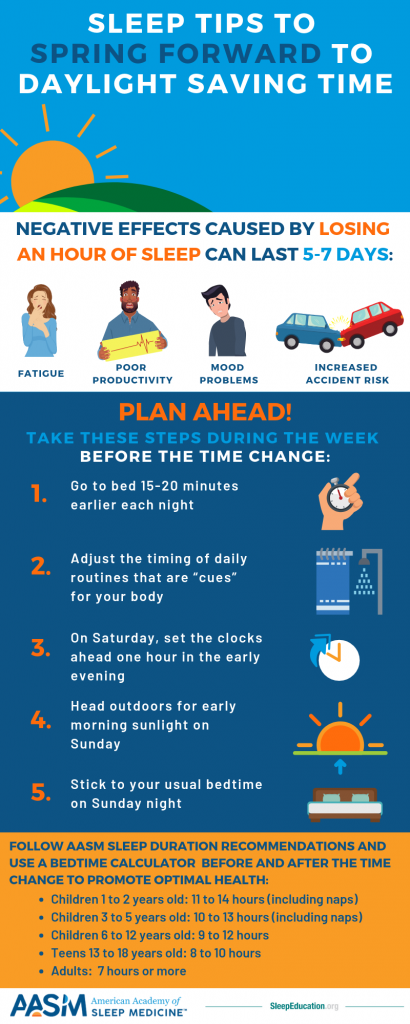This post is sponsored by the American Academy of Sleep Medicine.
I am not a huge fan of Daylight Saving Time {DST}. It’s outdated, it’s confusing because not every state uses it, and it can be a rough adjustment- especially if you don’t get enough sleep as it is. {So every parent, ever.} But unless you want to be really late to everything for six months, if you live in a state that observes DST then you really don’t have much choice. Luckily there are some ways to combat the adverse effects of “Springing Forward”!

1. Gradually adjust your sleep times starting two to three nights in advance of the time change. Shift your bedtime 15-20 minutes earlier each night so that by the time change, it’s not as big of a shock. {It’s too late to try this for this year with it being tomorrow night, but this happens every year!}
2. For a few days before the time change, adjust some of the other “time cues” for your body- eating dinner, turning off your phone, even getting ready for bed.
3. On Saturday night, switch your clock an hour ahead before you even go to bed. Then go to sleep at your normal bedtime.
4. Get some early morning sunlight on Sunday. The bright light can signal your internal clock, which can help to regulate sleep and alertness.
5. Make sure you go to bed early enough Sunday night to get plenty of sleep for Monday!

These tips from the American Academy of Sleep Medicine {AASM} can all add up to a more peaceful transition. {But no, sorry, it won’t teach your kids to sleep in overnight. Trust me on that one.}
Millions of Americans already fail to get the recommended seven or more hours of sleep per night {I’m among them!}. It’s so important to get enough sleep year-round, not just during the Daylight Saving Time transition- chronic lack of sleep can lead to an increased risk of diseases like cardiovascular disease, stroke, type 2 diabetes, hypertension, depression, obesity, and even several types of cancer. There may even be a connection between poor sleep and Alzheimer’s disease! Sleep needs vary, but the AASM recommends that adults get seven or more hours of healthy sleep on a regular basis for optimal health, productivity, and daytime alertness. The AASM bedtime calculator can help you figure out an appropriate nightly bedtime for you that will work beyond this weekend and throughout the year!

For those already not getting enough sleep on a regular basis- especially teens- this time change can be especially difficult. If this sounds like you, I really encourage you to take the steps above to make the transition as easy as possible, and to check out the AASM website for tools that may help you sleep better throughout the year.
Twitter Party Alert: Join the AASM on March 15, World Sleep Day,
at 2pm EST for a twitter party to learn more about this annual event that raises awareness of sleep disorders and the burden that they place on society. There’s a $100 gift card up for grabs and you’ll learn more about good sleep! Tweet along using the hashtags #WorldSleepDay and #HealthySleepChat!
Learn more about the importance of sleep and get tips for improving your sleep habits at the Sleep Education website. And don’t forget to Spring Forward this weekend!

Leave a Reply